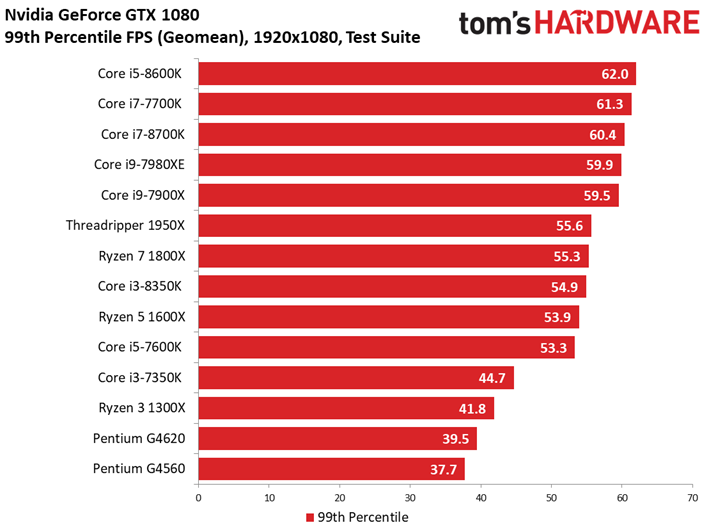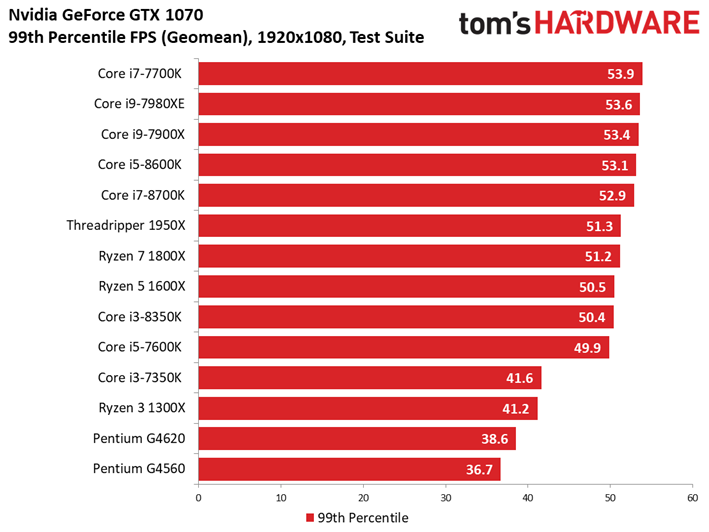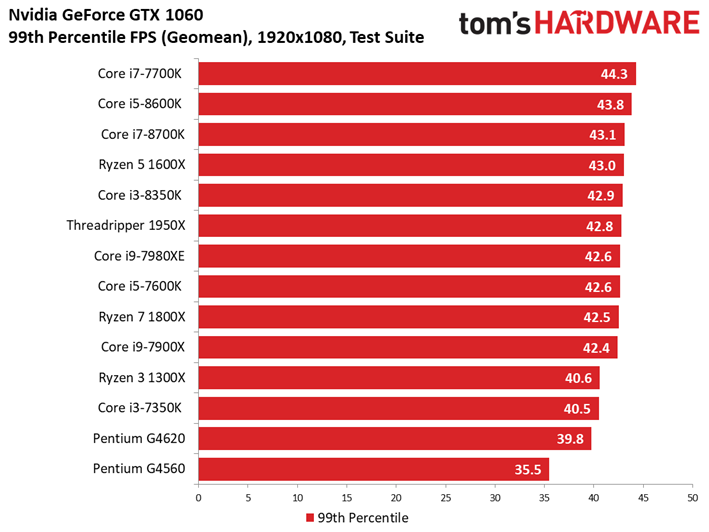How to Choose the Right CPU for 1080p Gaming: 14 Processors Compared
The Best Combinations of CPU and GPU at 1080p
Boiling our testing down into one general recommendation is almost impossible, especially given the pricing of graphics cards right now. But we can identify some of the more obvious trends.
Fast-paced first-person shooters tend to prefer high clock rates and fast graphics cards. Nimble CPUs like the Intel Core i5 and i7, and AMD's Ryzen 5 and 7, fare best in our performance measurements. Some titles are easily graphics-bound, though that could be due to poor optimizations or minimal effort to parallelize the game engine. PlayerUnknown’s Battlegrounds is the perfect example. It doesn't respond at all to faster processors. It's far better to buy a higher-end graphics card if that game is your main squeeze.
Real-time strategy titles seem to respond more favorably to CPUs with lots of cores; so do many turn-based games. Of course, that genre isn't as sensitive to graphics performance because it doesn't require quick response times. But a fluid experience in RTS games is a must. Often, host processing is the bottleneck, so dialing back your GPU investment and buying a better CPU yields the best performance possible.
Charting Out The Trends: The Best Pairings
We typically plot our test results on a scatter chart with price and performance on two axes, but we aren't even going to take a stab at graphics pricing during these tumultuous times. Instead, we're providing a geometric mean of the 99th percentile frame times, representing smoothness, converted into an FPS measurement for each class of graphics card. Each game factors into this calculation except for the artificially hamstrung Hitman.



Balance is the goal here. Intel's Core i7-8700K is the first chip we think of when it comes to top-of-the-line for gaming PCs. But it doesn't always lead in our benchmarks. It would likely fare better with more heavily threaded titles tested. Otherwise, the Core i5-8600K seems to be a better value pairing for Nvidia's GeForce GTX 1080.
The GeForce GTX 1070 pairs well with either a Core i5-8600K or Ryzen 7 1800X, though the latter notably offers additional performance in other enthusiast-oriented desktop apps. We've also found that the Ryzen 7 1800X is a great chip for game streaming, so give it serious consideration for more taxing workloads. If you're looking to go Intel, aren't interested in overclocking, and want to save a few dollars, the Core i5-8400 complements a GeForce GTX 1070 well, too.
On the value scale, Core i3-8350K and Ryzen 5 1600X both pair well with a GeForce GTX 1060. If you're willing to do a bit of overclocking, though, a Ryzen 5 1600 looks even better.
Get Tom's Hardware's best news and in-depth reviews, straight to your inbox.
Speaking of overclocking, most of the CPUs we tested can operate at even higher frequencies. AMD has a much friendlier policy here; all of its chips are unlocked. Meanwhile, Intel charges a premium for its unlocked K-series SKUs. If you want to know more about available headroom, we have plenty of test results with every processor overclocked in their individual reviews, so head to those for an idea of potential gains.
Of course, our findings would be all the more interesting if we could run out and build a well-balanced machine with affordable hardware. Here's hoping the availability of graphics cards improves sometime soon!
MORE: Best CPUs
MORE: Intel & AMD Processor Hierarchy
MORE: All CPUs Content
Current page: The Best Combinations of CPU and GPU at 1080p
Prev Page PlayerUnknown’s Battlegrounds (PUBG)
Paul Alcorn is the Editor-in-Chief for Tom's Hardware US. He also writes news and reviews on CPUs, storage, and enterprise hardware.
-
psiboy Would Have been good to see fx chips and first gen i series. That could explain why Mine appears to be the only comment in a week!Reply